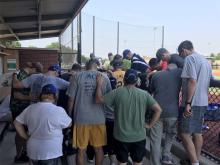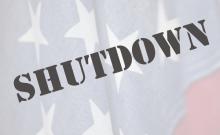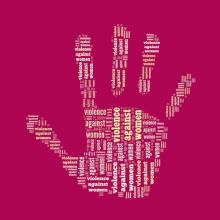house GOP

Political and religious leaders offered prayers for Rep. Steve Scalise and four others who were injured in a shooting during a GOP congressional baseball practice.
The Democratic team stopped their practice following the shooting on June 14 in Alexandria, Va.
One of the most meaningful things I get to do in my work as a Ph.D. student in political science is assist Jim Wallis with a course he teaches at Georgetown every fall titled "Faith, Social Justice, and Public Life." Jim is well known as the founder and leader of Sojourners and as a lifelong advocate for social justice. Through lectures, discussions, and guest speakers, our students learn about how and why clergy and lay people of various religious backgrounds advocate for public policies as expressions of their faith commitments. This fall, the push for comprehensive immigration reform was one of the case studies we examined with our students.
I'm no expert in immigration policy. But, as a political scientist, I can offer an informed assessment about when, why, and how the House of Representatives will pass the reform in 2014. This will be the subject of a future post. For now, though, I want to highlight some distinctive features of the debate that I have noticed as an observer of religion in American politics. I do have a layman's interest in the theological justifications being offered in support of (and, perhaps surprisingly, against) comprehensive immigration reform. But for now, I will focus mostly on the politics.

One of the most depressing things I heard on the first day of the government shutdown was that it was a record fundraising day for both parties. Washington, D.C., is no longer about governing; it is just about winning and losing. But the people who will lose the most during a government shutdown — and then an impending United States government default on paying its debts — are those who live day to day on their wages, those at the lower end of the nation’s economy, and the poorest and most vulnerable who are always hurt the most in a crisis like this. And what happens to those people is the focus of the faith community; that is our job in politics — to talk about what happens to them. Faith leaders have been meeting to discuss what we must do in response to this political crisis brought on by absolute political dysfunction
The government shutdown seems to have gotten the attention of the nation. And if this ends in a default on our debt, the potentially catastrophic crashing of the economy will certainly wake us up. The only positive I see in this crisis is that the right issues — the moral issues — might finally get our attention.

The House of Representatives passed on Wednesday a version of the Violence Against Women Act that would limit protections to immigrant, LGBT and American Indian abuse  victims. House Republicans argue that Democrats are politicizing a non-issue, but stating fact is not partisan politics.
victims. House Republicans argue that Democrats are politicizing a non-issue, but stating fact is not partisan politics.
The new version of the bill not only deletes new protections that received bipartisan support in the Senate, but also eliminates ones that existed in previous versions of the Act. For instance, the new version could make it more difficult for immigrants married to abusive U.S. citizens come forward for fear of losing their residency.